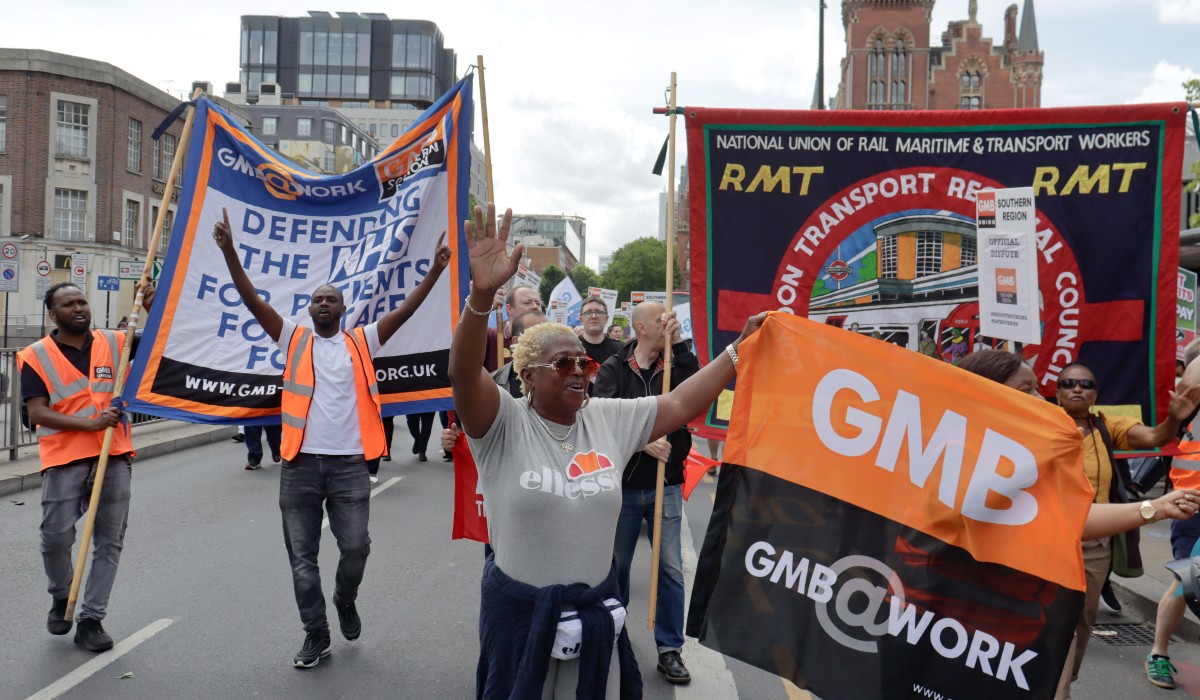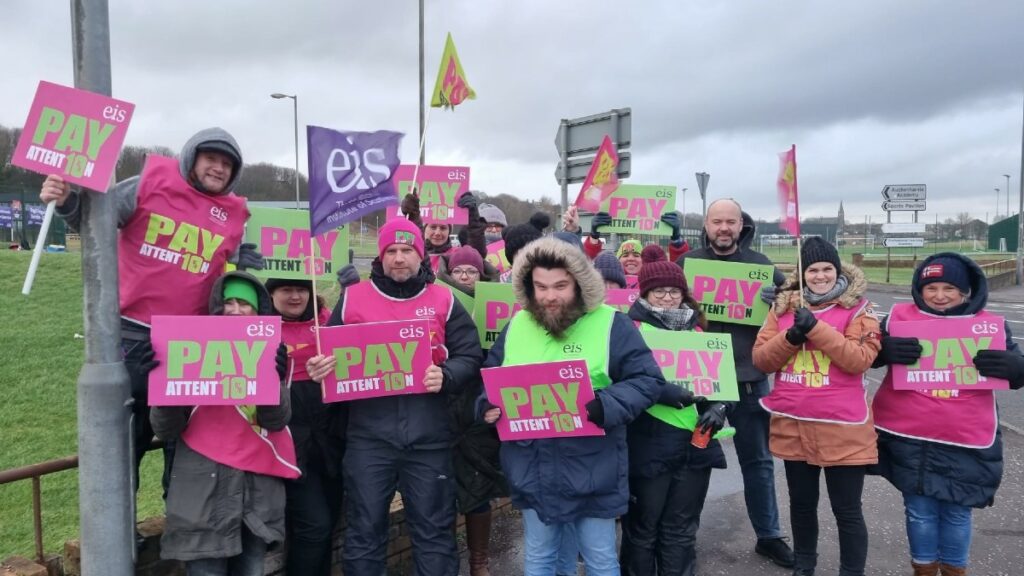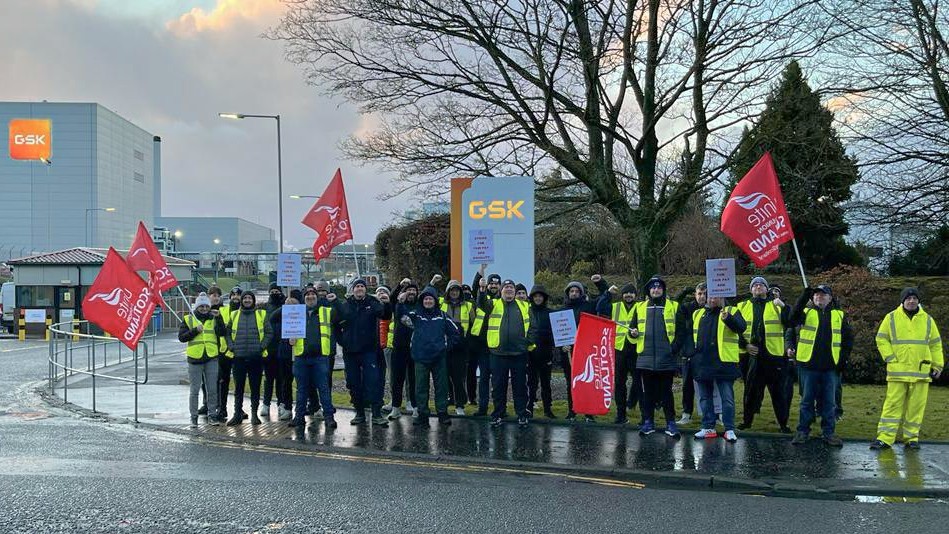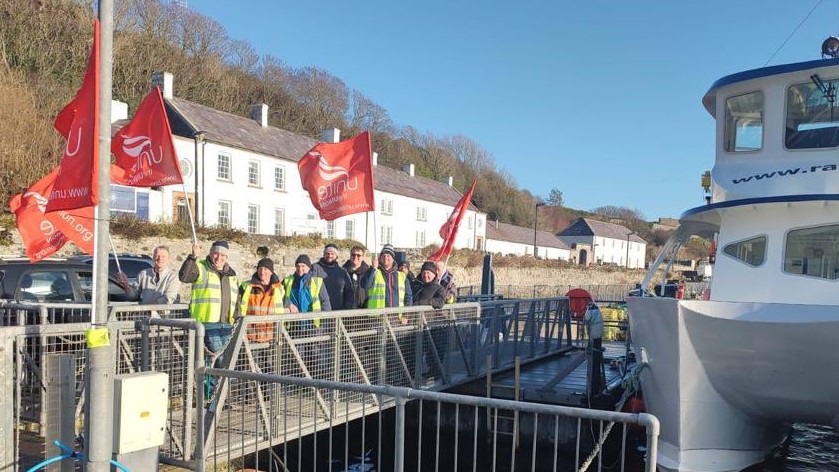 1 October strike rally, King's Cross. Photo: Steve Eason / Flickr / CC BY-NC 2.0
1 October strike rally, King's Cross. Photo: Steve Eason / Flickr / CC BY-NC 2.0
Counterfire’s weekly digest with the latest on strikes and workplace struggles
You can sign up to receive News from the Frontline straight in your inbox
The scale of the cost of living crisis and the all-out Tory assault on the public sector should have been met with a far greater level of coordination in the industrial fightback already. The Tory plans to introduce draconian new legislation banning effective strike action in key sectors and the catastrophic crisis in the NHS adds imperative.
After much anticipation, the TUC this week announced a national ‘day of action’ on 1 February. This falls far short of the calls for a general strike or even a basic level of coordinated strike action among unions with live strike ballots. It does, however, open up the possibility for unions to take the initiative and get as close to that as possible anyway.
PCS has taken the lead and announced 100,000 of their members will be striking on 1 February, and it is anticipated that the National Education Union will call its first day of strike action that day if it wins its ballot (results will be announced on Monday).
Other unions have until midweek next week to give the legally-required two-week notice if they want to join in. The UCU announced on Thursday that they will be taking 18 days of strike action in February and March – they should make the 1st one of their strike days. Other unions with local or national strike mandates should be joining in too.
Any hesitation on the part of union bureaucracies to build joint-up, class-wide struggle should be met with pressure from rank-and-file members to get their act together. 1 February is also an opportunity for the wider movement to mobilise the widespread support for the strikes and unite the opposition to the Tories.
We hope to see coordinated strikes, protests and rallies in towns and cities all over the country and we encourage our readers to get involved in making this happen through your unions, local trades councils and People’s Assembly groups.
Unite in West London: traffic wardens have had enough
Traffic wardens and CCTV officers in Brent, Hounslow and Ealing are walking out for two-weeks from 18 January in defiance of an insulting pay offer from privatisation barons Serco.
Unite’s Clare Keogh says:
“Serco and the London boroughs still have time to prevent a strike and the resulting loss of income. If the strike goes ahead it will mean free parking while workers fight for fair pay. The truth is that the council workers face real hardship when inflation is around eight times higher than their pay offer. For workers on the living wage, it’s hardly enough to live on.”
Serco’s profits are in the hundreds of millions – and we know why. The workers are after 14%. Two weeks all-out is big-play from Unite, let’s hope it works.
Cabbies grind Cardiff to a halt
Unite taxi drivers in Cardiff brought the city to a standstill on Thursday 9 January with hundreds of drivers protesting council plans that will force many out of work when they are struggling with the cost of living crisis.
The council is planning to remove the restriction cap on how many Hackney license vehicles there are in the city.
Md Anamul Munir, a driver and a member of Unite, told Voice Wales that taxi drivers today are not even able to make minimum wage:
“We are stuck waiting at taxi ranks for an hour, sometimes even two hours for a single customer. And depending on how far the customer is going, I end up getting just £6 or £8. We have to pay our bills and feed our families. This is our main job, we are really suffering.”
Massive education sector strike in Scotland
Four education unions in Scotland have been on strike after rejecting a below-inflation pay offer from the Scottish Government. The Educational Institute of Scotland (EIS), NASUWT, Scottish Secondary Teachers’ Association (SSTA) and the Association of Headteachers and Deputes (AHDS) held strike action on 10-11 January.
Mike Corbett, national Scotland official of the NASUWT union, said:
“The fact we are talking is progress itself, but I have to say there is still quite a distance between what is on the table and what teachers are looking for. The last offer was dressed up as an improved offer, but it remained, for the vast majority of teachers, the 5% offer that had been around for months.”
EIS general secretary Andrea Bradley said:
“Only a significantly improved offer from the Scottish government and COSLA can bring an end to this dispute.”
The EIS has announced its members will be taking industrial action every working day between 16 Jan to 6 Feb.

Tory union laws mean NASUWT falls short of threshold
The teaching union NASUWT has announced the results of their national ballot for strike action. Unfortunately, despite 90% of the vote supporting strike action, they have fallen just short of the 50% turnout threshold in the UK’s anti-trade union laws at 42%.
General secretary of the union, Dr Patrick Roach said:
“The readiness of our members to support industrial action demonstrates the anger of the profession and the need for governments in England and Wales to engage in meaningful negotiations to address the deep concerns of our members”
The National Education Union will announce the result of their ballot on Monday 16 January.
CWU to re-ballot Posties
The CWU has announced that it will re-ballot members working for Royal Mail over their long-running dispute.
Industrial action ballots in the UK must be renewed after 6 months due to the Trade Union Act 2016. The ballot will open on 23 January and close on 16 February. In the meantime, the CWU are in negotiations with Royal Mail until 20 January.
FE rancour rumbles on in the Home Counties
Union members at a Hampshire agriculture and environment college have begun a three-day strike over pay.
Workers walked out at Sparsholt College in Winchester for three days commencing Monday 9 January.
Branch secretary Nick Lindsay says:
“There’s a lot of pressure on salaries and the cost of living is having a huge impact. Salaries have fallen 25 per cent from where they should be, taking inflation into account. There’s a sense of unity along the picket line. Lots of staff who have come out are all voicing the same opinions that they need to be recognised for their hard work.
“The management team was quite reluctant to meet with us to start negotiations after we rejected their proposal in June.”
UCU have clocked £7m in the college’s reserves and highlights its below-par expenditure on wages relative to sector norms.
Bosses need to realise we are redressing the injustice of the austerity years as well as dealing with the cost of living crisis.
GSK Irvine hit by construction strike
40 construction workers on GSK’s Irvine site in Scotland started a two-week strike on Monday, in pursuit of a £2.37 hourly bonus payment.
The building workers, employed by Kaefer, are asking for a bonus they are entitled to under the NAECI national agreement. Their spokesperson said that GSK, which awarded the contract, made an operating profit of £1.2bn last year and could easily afford the pay the claim, but that GSK and Kaefer were passing the buck among themselves “and it’s our lads and lassies that pay the price”.

Northern Ireland Health and Social Care workers call strike dates
More than 4,000 health and social care workers, members of Unite the Union in Northern Ireland, are due to strike across the 5 health trusts and the ambulance services, in pursuit of a cost of living pay increase.
The workforce voted by 87% to strike, following the department’s complete failure to enter into talks. The union is now calling on prime minister Sunak to “bang heads together” in the absence of a functioning Stormont administration.
The strike dates announced so far are: 26 Jan, and 16-17 and 23-24 Feb. They follow the announcement of strike action in trusts across England and Wales, and are a sign of the immense frustration felt across the health service.
Hackney: Unison librarians fight to save service and jobs
Hackney Unison library workers were on strike Tuesday and Thursday and will be striking again on Monday 16 and Friday 20 January.
The workers are fighting Hackney Council who are ‘restructuring’ library service and proposing major job cuts. Unison says the council wants to cut the equivalent of 19 full-time jobs which could result in 44 people losing their jobs.
The workers say the service they provide will be unsafe for staff and unfair to the public.
Hackney Unison branch chair Brian Debus said:
“About 43 per cent of Hackney are members of the library service so it’s got a very high duty, particularly amongst those sectors of society who tend to be the most deprived.”
One of the library workers, Wendy Edwards said:
“We are under a lot of pressure and it’s also that we may be losing our jobs. We just want to save our libraries and our jobs.”
Rathlin Island ferry crew make waves
Unite members who crew the Ballycastle-Rathlin Island ferry, are striking every Tuesday, Thursday, Saturday and Sunday, for a cost of living increase to their wages, which have not seen a rise in four years.
The ferry is an essential lifeline for the 150-plus community on the Island, which lies six miles off the Antrim coast, and Rathlin Island Ferry Ltd (the company that operates it) has an income guaranteed by the Department for Infrastructure.
The crewmembers are asking for nothing more than that some of that guaranteed income goes to the people who actually operate the service. Rather than talk to the union, the company is threatening to go into liquidation at the end of January.
The union is demanding that the DoI stops regarding the workers and community as expendable, and if necessary, that it brings the outsourced ferry link back in-house.

The bins are out on Liverpool
Unite members in arms-length outsourcing front Liverpool Streetscene Services Ltd (LSSL) are set to strike in a fight for pay.
The 80-plus street cleaners and bin collectors are waking out from Monday 23 January until Saturday 28 January.
Unite are after a 4% pay-rise and a one-off £1,800 payment. The union says the workers’ pay demand is in addition to the pay increase they received as part of the green book settlement for 2022/23.
LSSL is wholly-owned by Liverpool City Council. No Labour council should be neglecting its staff like this.
Unite dispute on London buses rumbles on
Abellio Unite bus drivers in South and West London continued striking over pay this week and will be back out on their very lively picket lines on 16, 19, 25 and 26 January.
Unite says the pay deal on offer means drivers who’ve been on the job less than two years will earn £3.29 less an hour, the offer also falls short of what all drivers are demanding.
The strikers were also out in November and December and Unite says they will put on more dates if the dispute is not resolved.
Uber drivers protest in Southampton
On Tuesday Uber drivers in Southampton held a protest and marched through the city centre in heavy rain over Uber exploitation. The workers chanted ‘End Uber Slavery’. The protest was organised by SNPA and members of the ADCU were there in solidarity.
Welsh Labour rules out NHS pay rise
Welsh First Minister Mark Drakeford has ruled out a significant pay rise for NHS staff in the country.
Ministers have claimed that the RCN’s demand for a restorative pay deal of 19% is unaffordable, instead offering between 4% and 5.5% along with an unquantified one-off payment.
Drakeford said that any pay offers must remain in line with those made in England, effectively holding Welsh workers hostage to the decisions of the Conservative government.
Unions shun NHS Pay Review Body
14 health unions representing more than 1 million NHS staff announced on 11 January that they will not submit joint evidence to the NHS Pay Review Body (PRB) while the current pay disputes continue, with the RCN describing the PRB as ‘currently not fit for purpose’ and Unison stating that it takes far too long to make decisions.
Health unions are of the opinion that it would be quicker and more worthwhile to negotiate directly with ministers rather than at arm’s length. The PRB is described as being independent of government despite receiving a set budget from the government that it cannot exceed, causing the unions to question its impartiality.
The unions refusing to submit joint evidence are: British Association of Occupational Therapists, British Dietetic Association, British Orthoptic Society, Chartered Society of Physiotherapy, Royal College of Podiatry, Federation of Clinical Scientists, GMB, Managers in Partnership, Prison Officers Association, Royal College of Midwives, Royal College of Nursing, Society of Radiographers, Unison and Unite.
On the site:
The Secret Train Driver: bad faith and ideology from employers and government: We need to coordinate action on 1 February, escalate to win, and bring down the government, says the secret train driver
What do you call a system when you can’t withdraw your labour? Slavery – weekly briefing: Lindsey German on the Tory attack on the right to strike
5 things to do this week:
- Join the People’s Assembly national conference on Saturday 14 January which features a panels on the NHS crisis and trade union struggle with great line-ups. Register here.
- Join your local RCN picket lines on Wednesday 18th and Thursday 19th January. In London, get down to the solidarity demonstration on the 18th at 2.30pm outside UCLH. Protests and solidarity rallies are also being called around the country.
- Join the Stop the War Trade Union Conference on Saturday 21 January – book here.
- Join demonstrations opposing the Tories’ new anti-union legislation. There is one in London on Monday 16 January, 6pm at Downing Street, and more are being called in other parts of the country.
- The BMA are balloting Junior Doctors to strike over pay and have called a ‘London Pay Restoration Rally’ Saturday 14 January 2pm Central Hall Westminster, SW1H 9NH. NHS SOS have also called a national day of action on Saturday 28 January with events in towns and cities across the country. All events will be listed on the SOS NHS website and please fill in this form if you would like to organise an event near you.
Before you go
Counterfire is growing faster than ever before
We need to raise £20,000 as we are having to expand operations. We are moving to a bigger, better central office, upping our print run and distribution, buying a new printer, new computers and employing more staff.

